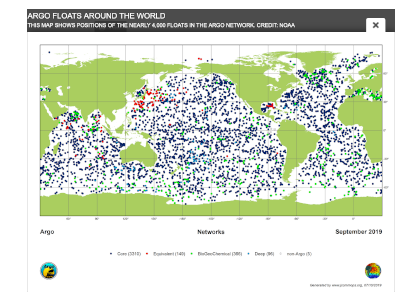Four new research projects are giving a boost to NOAA’s ability to measure, track and forecast ocean acidification, warming and other important ocean health indicators.
NOAA Research’s Ocean Observing and Monitoring Division has awarded $3 million in funding for projects that will expand the ability of the global Argo Program to measure ocean chemistry.
Two of the selected projects will partner with ocean observation technology companies Sea Bird Scientific and MRV to refine biogeochemical (BGC) Argo float designs and test new sensors through the release of about 20 floats in the Tropical Pacific, an important region for understanding the ocean’s role in the global carbon cycle. Two additional projects will support selected NOAA Research Laboratories and Cooperative Institutes in developing and deploying BGC Argo floats and using the resulting information to describe ocean chemistry changes in the California Current Large Marine Ecosystem and northwest Atlantic ocean — both significant areas for fisheries.





